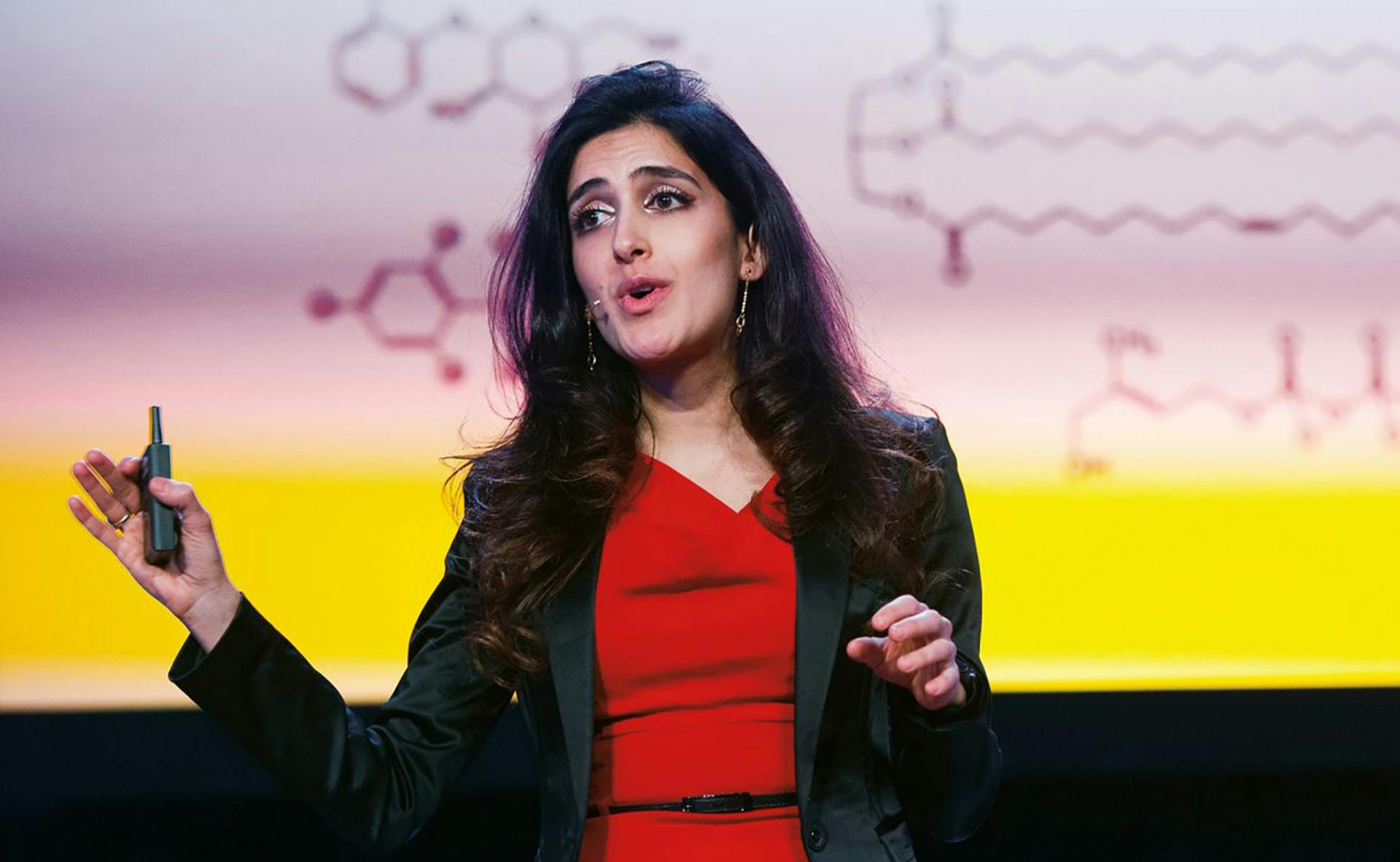Artificial intelligence can do a lot of things. It can help farmers know when to plant crops. It can help utilities optimize energy use. And because of the work of Leila Pirhaji, it can be used to discover new drugs to treat (currently) incurable conditions.
Pirhaji is the founder of ReviveMed, a Cambridge-based biotech startup using AI and machine learning to tackle medicine as a data science problem. While working on her PhD in biological and biosystems engineering at MIT, she became fascinated by the complex interactions between proteins and metabolites—a massive class of biomolecules. Metabolites are one of the most trustworthy diagnosis and assessment tools for understanding a host of metabolic diseases and their progressions. Unfortunately, they are so numerous that we don’t even know how to identify all of them in a sample without a ridiculous investment in both time and money. Pirhaji realized that identifying metabolites requires dealing with exactly the kind of big-picture, undecipherable data that algorithms and machine-learning platforms were made for.
With that, ReviveMed was born, and the potential is so promising that she has already raised over $1.5 million in seed funding. In April Pirhaji gave a TED talk about her work with metabolites, and Overture had a chance to talk to her about the scale of her work, which is at the same time both massively vast and incredibly small.
Do you consider ReviveMed primarily to be a medical company or a tech company?
To be completely honest, when we are hiring people, I tell candidates that we run our company like a tech company—really focusing on the traits that make them so successful. The efficiency of technology companies has been so much greater than the efficiency of traditional pharmaceutical companies. That's why people seem more excited to work at tech companies. So we do things, for example, like daily stand-ups, which are very common at tech companies when they are developing their software. But every day, most of what we work on is data-driven, but we're applying all of it to the biological field. So ultimately, we are a biotech company.
Have you been working in technology your whole career?
I grew up in Iran and really started everything there. We could actually go to medical school right after high school. After I got into medical school, I realized I didn't really like it because I really liked mathematics, so I switched my major to go to the University of Tehran and studied biotechnology, which is kind of similar to bioengineering here at MIT. It was a very new field back then, but everything I studied both at Tehran and MIT was about how we can use technology and engineering in biology. And because I was really good at mathematics, I just got into the field developing algorithms for understanding different sets of data, and that has become my passion.
What are you focusing on right now?
We have an internal therapeutic program, and we are focused on finding therapeutics for diseases that are driven by small molecules in our body. This is actually what makes [ReviveMed] unique. Because the availability of data enables us to develop AI, lots of AI platforms focused on drug development are focused on genomics, which we have a lot of data about. We love genes and RNA and DNA, but, you know, just looking at DNA alone doesn't give us enough information to discover effective drugs, because there is a combination of genetic factors as well as lifestyle and environmental factors that lead to a disease. There are many diseases affecting our population right now where, because it's a combination of genetic as well as lifestyle factors, it’s really hard to develop a clear picture of how to treat them. One of those therapeutic areas that interests us the most right now is fatty liver disease. This is caused mostly because of obesity and diabetes. It's a huge problem, affecting over 20 percent of the population globally, and it has no treatment. It's becoming the number-one reason for liver transplants in the U.S. It's a huge, huge problem. But, it's all caused by accumulation of fat molecules, specifically in the liver.
These small molecules and metabolites—there are over hundred thousand types of them in our body. There is so much data we can get from these molecules, but they have been very underutilized in how we understand these diseases. That's mainly because it's very hard to characterize all of them in a given sample. I like to tell people that with metabolites now, we're where we were twenty years ago with genomics. Twenty years ago we were only able to study a handful of genes, and even that cost so much money. But there's way more metabolites than there are genes. And with current technology, we are only able to characterize less than five percent of them. And if you want to do the work of characterizing all of them, you would have to do more experiments, which could take decades and cost billions of dollars. It's not cost-effective or efficient.
That's one of the biggest areas in which AI could be a solution, because experimentally, we cannot solve this problem. And that's what we did during my PhD. I said, "Hey, can we develop a platform that leverages the available biological data and computing power to use that information to characterize molecules in our body and reduce the need to experiment?" Because then we could could characterize a larger number of molecules and understand that data for therapeutic purposes.
How are you focusing your efforts in order to keep driving forward?
Beyond fatty liver disease, we actually have a few active programs in two other therapeutic areas as well that we haven’t announced to the public yet. But we are primarily focused on ReviveMed as a technology platform, and building that technology platform. And because that platform is focused on the new frontier of metabolomics, we are focusing initially on diseases where metabolites are the key drivers of progression. That’s the best use of our technology. We’re able to use it to bring new sets of data to the picture that the medical community has never had before. There are hundreds of diseases that are primarily driven by metabolites, so we will be tackling more and more diseases as we grow.
What’s striking about this platform is that it’s allowing us to learn more about how the human body works. But AI is relatively new, right? Is this research causing us to learn more about how AI works?
I think a lot of AI programs were developed, what, six years ago? But even twenty years ago, we were already developing deep learning programs. Only now are we able to use those algorithms in biology. The big challenge we are facing at ReviveMed is learning how we could turn biology into a data science problem.
Machine-learning algorithms have been being developed for a long time, and in addition to the ones we are developing, sometimes we just have to tweak what’s there just a little bit, and it can be used to solve a biology problem. We have a very multidisciplinary team, with people who specialize in mathematics, or AI, or biology, or software engineering, and that is what we are working on together.
What do you see happening in the future for bioinformatics?
Back when I first started, I couldn't have imagined being able to run the types of programs I can run now, just in the cloud. We didn’t have gene sequencing like we do today. We didn’t have enough computing power. Now, we have more data available than we’ve ever had before, we’re learning better how to analyze it, and we’re doing it faster and cheaper.












